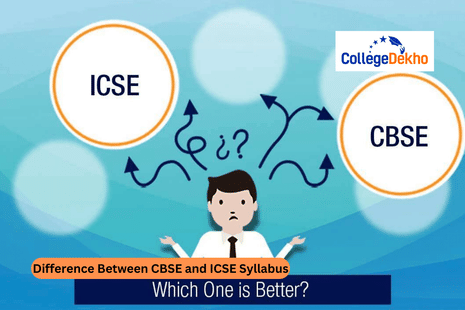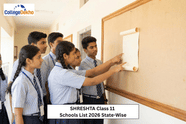
Choosing the apt educational board for both parents and students has been a critical decision over the years, as the entire educational journey of a student lies on this decision. It has been observed that often, parents choose either CBSE or ICSE among the various board available in India. Now, looking on a restricted perspective, there has always been tug of war between CBSE and ICSE. The main difference between the CBSE Class 10 Syllabus and Indian Certificate of Secondary Education syllabus is that the former board focuses on the core subjects like Science, and Mathematics, preparing the students for Engineering, and Medical entrance exams, while the later one deals with a broader carriculum with equal emphasis on languages, arts, and sciences. CBSE is known for its simpler and concise syllabus which is primarily designed to develop students intellect and personality. On the other hand, ICSE syllabus is more detailed and comprehensive that offers a more in-depth learning experience of the students.
Moreover, developed by the National Council of Educational Research and Training (NCERT), the CBSE curriculum prepares the students practically for national entrance examinations like JEE or AIPMT. ICSE schools have a strong command over English, making it the only mode of instruction. Students who will be preparing to apply for foreign universities, ICSE can be a good choice as it will help in English proficiency tests like IELTS or TOEFL. Subjects offered in CBSE Class 10 syllabus generally includes core subjects like Mathematics, Science, Social Science, English, and Hindi/Sanskrit along with additional subjects and internal assessments, and practicals. ICSE includes a wide range of subject combinations with additional emphasis on practicals, and lab tutorials. Let us have more discussion on how CBSE is different from ICSE’s syllabus.
Difference Between CBSE and ICSE Syllabus Structure
The CBSE 10th syllabus is a structured curriculum that incorporates competency-based learning, emphasizes practical applications and skills like problem-solving and analytical thinking. CBSE has proposed some reforms to improve the education system which are:
- As per the new guidelines introduced by the board, from the academic year 2025-26 there will be twice Class 10 board exams a year in February and in April.
- This initiative has been taken in view of increasing flexibility, reducing stress level in students, and enhance the examination system.
- Additionally, the curriculum will focus more on competency-based questions, and conceptual understanding of the syllabus rather than memorization.
- CBSE has also planning to work on integrating experiential learning, project-based assignments, and technology-enabled education.
There are 5 core subjects in CBSE 10th curriculum including 2 language papers and 3 other subjects like Mathematics, Science, and Social Science. The maximum marks allotted for each subject in CBSE Board is 100, where the theory exam carries 80 marks and the internal assessments (projects, practicals) carries 20 marks. CBSE has increased the competency based questions to 50% from last year’s 40%, objective-type questions with a weightage of 20% will now be MCQs, and the weightage of short and long answer questions has been reduced to 30% from 40%.
ICSE 10th Syllabus comprises 3 groups where group 1 is compulsory for all, and students need to choose subjects from group 2 and 3. Each subject will be held for 100 marks and 2 hours where 80 marks will be for the theory and 20 for internal assessment. As per the new guidelines set by the Council, the number of analytical and application-based questions has been increased for the upcoming Class 10 ICSE exam. Aligning with the National Education Policy (NEP 2020), students will now have to apply their knowledge instead of memorizing facts. Till 2024, there was 10% analytical questions, that has increased upto 25% from the 2025 academic year. The exam includes various question types, such as objective and long/ short answer, with marks ranging from 1 to 5. There is no negative marking for any wrong answers.
Difference Between CBSE and ICSE Streams, Subjects Choices
CBSE includes 5 core subjects which are English, Hindi (or another language), Mathematics, Science, and Social Science. Some schools affiliated to CBSE may also offer elective subjects or skill-based subjects as part of the curriculum.
Compulsory Subjects |
|---|
Mathematics Standard OR Mathematics Basic |
Science |
Social Science |
Other Subjects (Any One) |
Carnatic Music (Vocal) |
Carnatic Music (Melodic Instruments) |
Carnatic Music (Percussion Instruments) |
Hindustani Music (Vocal) |
Hindustani Music (Melodic Instruments) |
Hindustani Music (Percussion Instruments) |
Painting |
Home Science |
National Cadet Corps (NCC) |
Computer Applications |
Elements of Business OR Book Keeping & Accountancy |
The ICSE Class 10 syllabus includes compulsory subjects like First Language (English), a second language, and Social Studies (History, Civics, Geography), along with optional subjects in Group 2 (Mathematics, Science, Economics, Commercial Studies) and Group 3 (Computer Applications, Art, etc.). Environmental Science, Physical Education, and various applications also come under the Group 3 category.
Groups | Subjects | Marks Allotted |
|---|---|---|
Group 1 (Compulsory Subjects) |
| 80 Marks Theory + 20 Marks Internal Assessment |
Group 2 (Elective Subjects) |
| 80 Marks Theory + 20 Marks Internal Assessment |
Group 3 (Additional Elective) |
| 100 Marks Theory + 100 Marks Internal Assessment |
CBSE V/s ICSE Theory and Practical Syllabus, Subjects
The theoretical subjects in CBSE 10th exam are English, Hindi or other Language papers, Science, Social Science, and Mathematics. The theory papers for all the core subjects carries 80 marks, and 20 maks are reserved for internal assessments. The internal assessments of CBSE 10th exams include periodic tests, notebook submission, along with subject specific other activities. The theoretical and practical subjects along with syllabus are tabulated below:
Subject | CBSE theory marks | CBSE 10th practical marks |
|---|---|---|
Hindi Course-A | 80 | 20 |
Hindi Course-B | 80 | 20 |
Science |
| 20 |
Social Science | History
Political Science
Geography
Economics
| 20 |
English (Communicative) |
| 20 |
Mathematics Basic | I: Number Systems II: Algebra III: Coordinate Geometry IV: Geometry V: Trigonometry VI: Mensuration VII: Statistics and Probability | 20 |
In ICSE 10th exam, for most of the subjects in Group I and II, the theory exams are worth 80 marks, and internal assessments (practical work, viva, etc.) are worth 20 marks, making the total marks to 100 per subject. For Group III subjects, theory and practical exams are each worth 50 marks, totaling 100 marks.
Group I: Compulsory Subjects
Subject | Syllabus | Internal assessment/ Practical Marks |
|---|---|---|
English |
| 20 marks for internal assessment |
History & Civics |
| 20 marks for internal assessment |
Geography |
| 20 marks for internal assessment |
Second Language | - Grammar-based questions. - Composition writing. - Literature questions based on prose and poetry. | 20 marks for internal assessment |
Group II: Elective Subjects
Subject | Syllabus | Internal assessment/ Practical Marks |
|---|---|---|
Mathematics |
| 20 marks for internal assessment. |
Science |
| 20 marks for internal assessment. |
Economics |
| 20 marks for internal assessment. |
Commercial Studies | – | 20 marks for internal assessment. |
Environmental Science | – | 20 marks for internal assessment. |
Read More CBSE Vs ICSE Board - Find the Difference and Know the Best Board
Difficulty Level CBSE V/s ICSE Syllabus
On a generic view, the difficulty level of the CBSE Class 10 exams is considered to be moderate to moderately difficult. Some subjects are slightly more challenging than others. Mathematics and Science are often considered as more challenging due to the application of concepts and numerical problems. On the other hand, subjects like English and Hindi are considered easier, with direct, NCERT-based questions. Compared to ICSE, CBSE’s papers are easier and more direct. On an additional point, CBSE’s cumulative grade point assessment (CGPA) evaluation system facilitates easy comparison and hence acceptance in various institutions.
The ICSE Class 10 exams are generally considered quite standard and challenging, with the difficulty level varying depending on the subject and the specific questions. While some papers like Math and Science, can be quite difficult, the subjects like social science and language papers can be less complicated. The exam pattern includes both theoretical and practical assessments, and the grading system can be stringent. In brief, ICSE can be more challenging than CBSE exams because of its comprehensive syllabus, a wider range of subjects, and a greater emphasis on critical thinking and knowledge based questions.
From the above given information, we hope that you could make your understanding a bit broader of how to choose the right board for your child. Whichever board you choose, it is very important that your child get the right academic guidance.Are you feeling lost and unsure about what career path to take after completing 12th standard?
Say goodbye to confusion and hello to a bright future!

Was this article helpful?





















Similar Articles
27th WB SET Bengali Cutoff 2025: Check expected cutoff, previous years' cutoffs
27th WB SET General Category Expected Cutoff 2025 for All Subjects
27th WB SET English Cutoff 2025: Check expected cutoff, previous years' cutoff trends
115 Marks in AP TET vs AP DSC Weightage Analysis 2025
SHRESHTA Class 11 Schools List 2026 State-Wise
125 Marks in AP TET vs AP DSC Weightage Analysis 2025